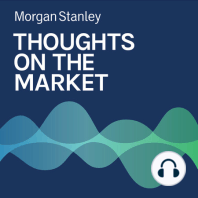3 min listen

Special Episode: How Will China Manage the Housing Downturn?
Special Episode: How Will China Manage the Housing Downturn?
ratings:
Length:
9 minutes
Released:
Sep 22, 2021
Format:
Podcast episode
Description
On this special episode, we address key questions around struggles in China's property sector, as well as any potential spillover into the broader economy.----- Transcript -----Chetan Ahya Welcome to Thoughts on the Market, I'm Chetan Ahya, Chief Asia Economist for Morgan Stanley,Robin Xing and I'm Robin Zing Morgan Stanley's Chief China Economist.Chetan Ahya And on this special edition of the podcast we'll be diving into the path forward for China's economy amid challenges in the property sector. It's Wednesday, September 22nd, at 7:30 a.m. in Hong Kong.Chetan Ahya So, Robin, as many listeners likely read earlier this week, China's property market is the subject of a lot of market and media focus right now. And near-term funding pressures for some of China's property developers have led to volatility as markets weigh concerns on any ripple effect into China's economy or even the global economy. To put funding pressures in context, in dollar terms, cumulative default in China's high-yield property names this year are already higher than that combined between 2009 and 2020. Robin, I want to get into your base case for China's economy as policymakers manage the property sector outcome. But to understand the backdrop for listeners, maybe it's worthwhile to take a step back to understand China's regulatory reset and the impact it's had on the housing market.Robin Xing So what we call China's regulatory reset is China's ongoing shift in governance priorities, which policymakers drafted last year. And it covers a number of areas, including technology, education, carbon emission, but also property developers in an effort to address the financial stability risks. So the property related financing has actually been tightening since summer 2020. You know, first with new financing rules for real estate companies--what's called the 'three red lines'--which put a leverage cap on developers, then a cap on property, long exposure for banks, and lately, very strict mortgage approval for homebuyers. In this environment, highly leveraged developers are more prone to refinancing risks. And now the question is, will there be more credit events to come? Going forward, tighter financing conditions may stay for developers, which could increase the risk of credit events.Robin Xing So, Chetan, you have been a close watcher for China's debt and the deleveraging dynamics since 2015. First, with its industrial sectors, then it's local government. Then we fast forward to today's housing market. Now, just to gauge how much deleveraging developers still have to undergo, how are we tracking on the three red lines as laid out by regulators? As I recall, developers are required to attain the 'green category,' meeting all three requirements by end of the first half 2023.Chetan Ahya Yeah, thanks, Robin. So, look, I think, first of all, just to appreciate the way China manages its debt challenges is it ensures that the process is taken up in an organized manner and that there are no uncontrolled defaults, which can have ramifications on the financial system as well as overall financial conditions. And property sector is no different. And on that front, our property analyst has been highlighting that out of 26 developers that we cover, only one developer still fails to meet all the three red lines and nine developers have already passed two of those red lines. The remaining 16 developers have already met all the three requirements, and most developers do target to attain green category by the end of next year. Currently, the total debt exposure of the property developers in China is around 18.4trn RMB, which is similar to the annual contract sales or annual sales of these companies, so the deleveraging pressure when you look at it in the context of the level of debt relative to sales, it does seem to be manageable for usChetan Ahya Having said that, Robin, and when you think about the importance of the property sector to the economy, it's quite a significant secto
Released:
Sep 22, 2021
Format:
Podcast episode
Titles in the series (100)
Mike Wilson: How Confident Are U.S. Businesses in the Economy? by Thoughts on the Market